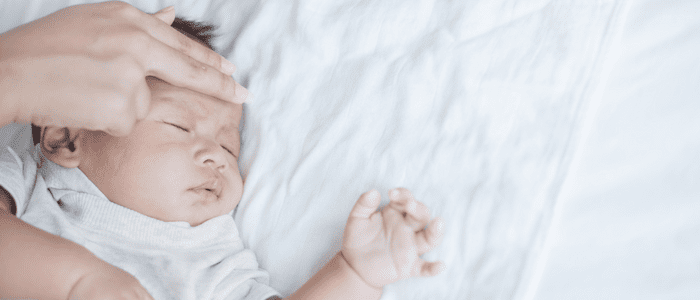Dr. Carole Anderson
A medical professional would confirm your child’s fever if they had a temperature of 100.4 degrees or higher. Normal temperature variations for children range from 97 to 100 degrees.
A child’s fever is a natural response signifying that their body is fighting an infection, whether viral or bacterial. The height of the fever does not indicate whether it is viral or bacterial — the flu can cause a fever of 103 and a child can have strep throat with a fever of 100.5.
Treatment
Treat the child, not the number.
- Watch and wait, hydrate, and dress them in light clothing (don’t sweat it out). If they are still overall comfortable, allow them to play, eat, and drink.
- If they are uncomfortable, administer acetaminophen (Tylenol) or ibuprofen (if over 6 months of age). Give the correct dose based on weight or age if applicable. It is NOT recommended to alternate medications – pick one and stick with one. Wait to see if the fever returns before treating again rather than scheduled dosing every 4 or 6 hours.
- Offer lukewarm baths. Cold baths will cause kids to shiver which only raises their temperature higher.
When to Call Your Pediatrician or be Seen for Your Child’s Fever
You should bring your child in if your baby is under 2 months of age and has a temperature of 100.5 or higher; if your child is older and has other symptoms such as a stiff neck, irritability, severe headache, signs of dehydration, widespread red or purple rash, severe abdominal pain, shortness of breath; and if your child’s fever lasts longer than 3 days.
Fever and seizures
Children under 5 can sometimes have a seizure with a fever, but they are more likely to occur if there is a family history of febrile seizures,
if they have already had one, or if the first one occurred before 15 months of age.
- Place your child on their side on a flat surface, make sure the area is clear of objects, and loosen their clothing
- Call your physician if lasts less than 2 minutes for further instruction or need for evaluation
- Call 911 for assistance if the seizure lasts more than 5 minutes, your child turns blue or has difficulty breathing
Still unsure of the severity of your child’s fever? Use our symptom checker to help you make an informed decision about your child’s well-being!
About Dr. Carole Anderson
Dr. Anderson completed her Pediatric Residency as well as a fellowship in Neonatology at Michigan State University in her home state of Michigan. She is Board Certified and a fellow of the American Academy of Pediatrics.
Dr. Anderson loves being a part of a child’s life from birth to adulthood, getting to be a part of that family’s growth, and laughing along with her patients. When she isn’t caring for her patients, Dr. Anderson enjoys fly fishing, hiking, paddle boarding, and traveling.


